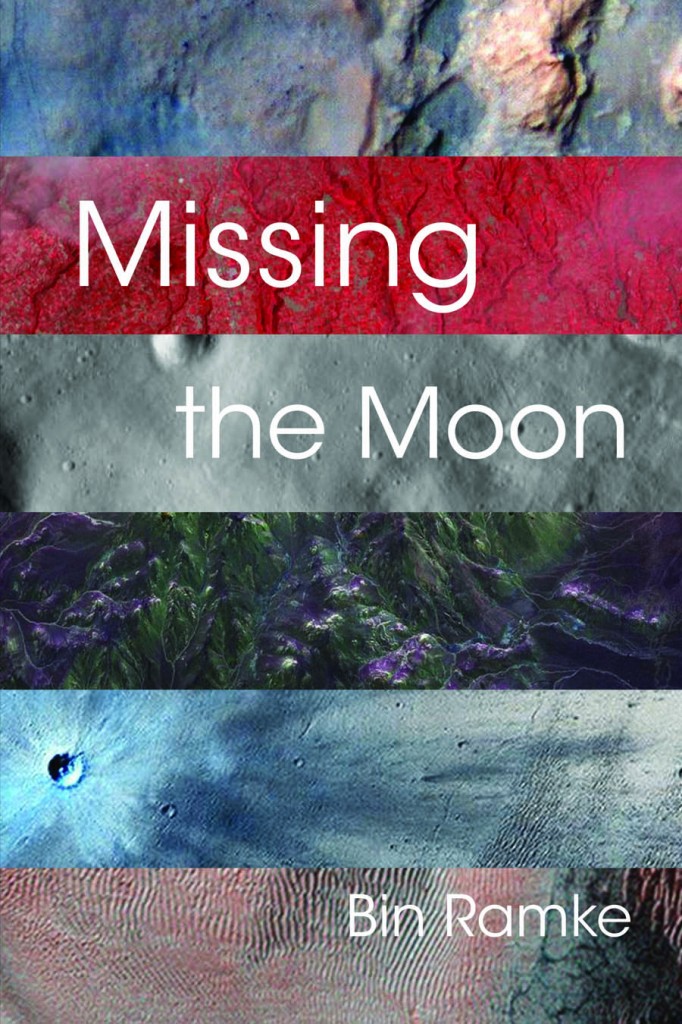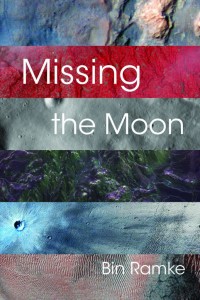Missing the Moon by Bin Ramke
-Reviewed by Claire Trévien–
The section titles in Bin Ramke’s twelfth collection Missing the Moon are stories in themselves: ‘The Inconceivable’, ‘Phases of the Earth’, and the especially delectable ‘Pronouncing the Asterisk’ which makes you want to roll the symbol around your tongue to get a sense of its weft. Titles of individual poems are arresting too, take ‘The Second Most Important Living Goddess Called Kumari Under the Moon’ for instance, which fortunately lives up to the impact with this showstopping start:
The word “goddess” can be filled
with flesh but not blood
It’s also one of Ramke’s longest poems in the collection, a sprawling work partitioned with epigraphs, asterisks and italicized words like ‘Names assigned’. Its sections do not at first feel wholly related: a meditation on words jumps to children playing, to the narrator’s road accident, to the narrator’s relationship with church filtered through college years, to a meditation on the voice, to the Kumari, finally, and their various names, to India’s mission to the moon. It’s an ambitious span of years, cultures, and registers that picks out elements sowed throughout the collection. Laying this out probably makes this poem sound portentous, and in places it certainly risks that label, but this careful layering of experiences and reflections does combine to a particularly stunning ending:
There are no rivers on the moon. India
did not need to spend sixty million dollars
to know that, but it was worth it
to learn that the ghost, the faintest ghost
of a river, can be found under its dust.The moon as our sister we knew always
had a shadow, a hint, a breath of River
in a secret repertoire.Between earth and moon is a bridge
sometimes whose molecules
we hold in common, water or its shadow,
the shadow of water; its thinness next
to nothing, unnamed both there and here.
I have quoted at length here so that you can see just how Ramke mingles facts, in a very conversational tone, with more metaphysical material. It’s a cliché to say that poetry is about the unspeakable, the inexpressible, but there is something appealing in the way that Ramke tackles it, both personal (the moon is ‘our sister’), intriguing (‘a breath of River / in a secret repertoire’) and made wider (‘we hold in common’…). There is real attention paid here to the concept of worshipping the unknowable, from the young pubescent girls held to be vessels for divinity (the Kumari of the title), to the moon itself.
I mentioned conversational, and it’s true that Ramke frequently brings in a more colloquial register to his poetry, stopping it from taking itself too seriously. In the next poem, ‘Intricate Picnic’ for instance, the closing lines of the collection are:
Old mistakes, made often enough, become
a kind of wisdom; go figure.
A neat undercutting of the attempted aphorism.
An obsession throughout Missing the Moon, which is detectable in ‘The Second Most Important Living Goddess Called Kumari Under the Moon’ too, is with words as a body, as a container. I say obsession, because variants on the theme occur in almost every poem, and if ‘word’ isn’t present, then a variant on the theme of enclosure, such as a garden, will be invoked. A few examples:
‘A word can contain terrors
readily as rotting logs leak legs, centipedes
and caterpillars.’(‘On the Vegetative Night’)
‘Conversation: we could see a word shared
required at dinner’(‘Picnic Among Strangers’)
‘The word for wordlessness is a wind with thistles’
(‘Why it is Painful to Speak’)
Yet, the embodiment of words is only invoked to be rattled. Much like the title itself, the words aimed for evade or are not the shape you expected: ‘Contain is what a body does’ Ramke says in ‘Of the Vegetative Night’, ‘until it doesn’t, then spells itself out’.
What of the moon itself? It hovers throughout the collection, winked at in the presence of asterisks which pepper Missing the Moon:
*
We call this an asterisk but I want moons
on the page to mark change like day
to night, month to next month, time not space;
We often use an asterisk to signal the presence of more information elsewhere. An asterisk is less normative than a footnote, a wildcard marker within a document without antecedent or descendent. Missing the Moon certainly explores some of these characteristics, but is also perhaps guilty at times of spending rather too long on exposition, and of wearing its learning earnestly on its sleeve. ‘Resonance’ seems particularly guilty of that, though some of its faults might be due to my copy being an uncorrected proof:
Imagine a leaf floating
, the boys below listening(Analysis of Newton’s Method to Compute Travelling Waves
in Discrete Media, H.J. Hupkes and Verduyn Lunel:
“We present a variant of Newton’s method for computing
travelling wave solutions to scalar bistable lattice differential
equations. We prove that the method converges to a
solution….to gongs, the vibrant water washing tears
away the bloom of bodies swaying to music
as to the glance of light pooling below.
Putting aside the errant comma and the disturbing disappearance of the closing bracket (both of which, one hopes, are not a deliberate move), this aside into scientific discourse disrupts the poem to very little purpose. Other than flooding the reader with jargon, the extract does not actually contribute useful information. I can’t help but wish that this section will be cut before final publication as its absence makes ‘Resonance’ a much stronger poem.
This is not to say that Ramke’s obvious love of both mathematics and science never successfully wed in his poetry, there are plenty of examples throughout: ‘Solve General Boundary Value Problems’, Ramke’s elegy to his brother based on David Hilbert’s twentieth problem, is particularly beautiful. The unyielding mathematical vocabulary melds powerfully with personal tragedy, keeping the latter from over-sentimentality which in turn increases the sense of pathos:
Euclidean n-space is homeomorphic to
Euclidean m-space if m=n
in other words when my brother died my father was already
dead my mother soon to follow.[…]
here is a question: “When can a topology on a space
be derived from a metric?” I could see only surface
no matter how deeply I dug – all I could expose
was surface, even of water, even of blood.
Or do we see into the body of water? When he drowned
did the touching interiors, body and water, mean?
Later in ‘Litmus’, Ramke declares that galaxies are ‘spinning like hard drives’. You can’t help but wonder who signed off this fundamentally impossible to understand image since spinning isn’t really a characteristic of hard drives. Bewildering, yes, but fascinating too once the physicality of hard-drives has been disposed of, and an appealing way of considering the cosmos. A useful way perhaps of summarizing Ramke’s compelling collection of echoes.



